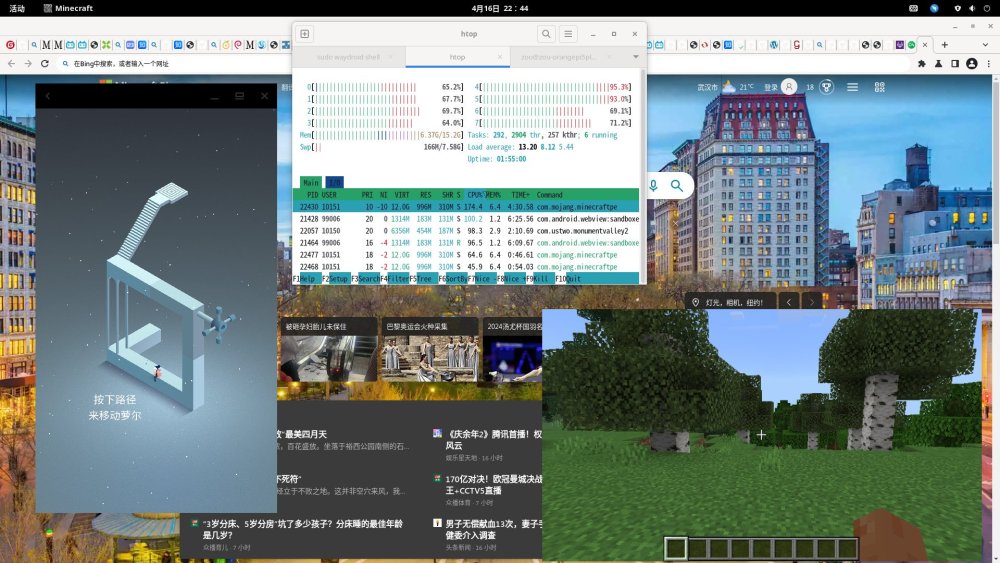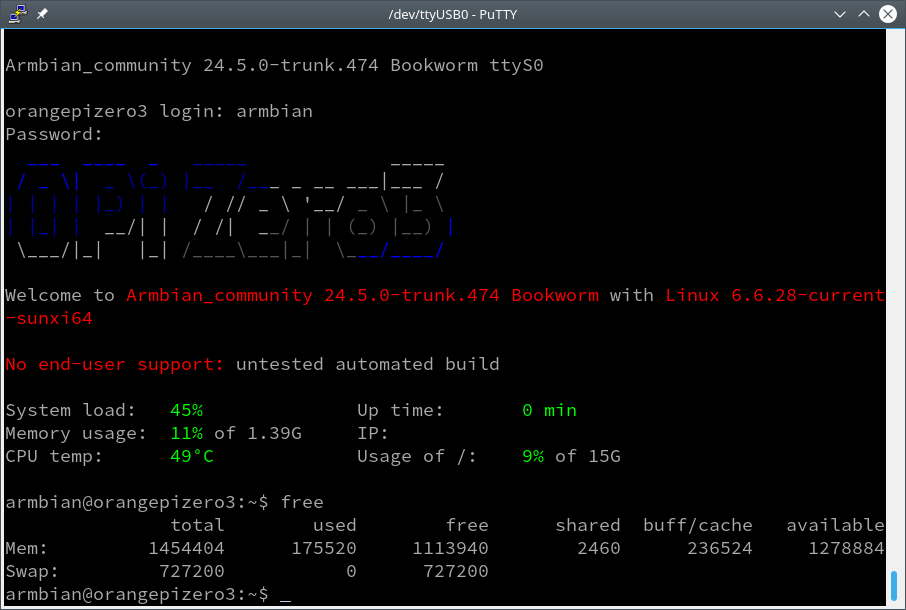Search the Community
Showing results for 'realtime kernel'.
-
Updated: The Armbian vendor kernel version now includes Panthor, and will soon be able to run it as well. Waydroid images: https://github.com/WillzenZou/armbian_fork_build/releases/download/willzen-armbian-24.5.0/2.waydroid-panthorv10-240416-v1.img.tar.gz Note: Waydroid needs to be run in the Wayland desktop environment. (Such as Gnome wayland, KDE wayland session) What's work: OpenGL ES is ok, I have tested some game: Mincecrat, gameSHINE, Monument Valley 2 What's not work: Vulkan. Video hardware decode and encode. How to use Waydroid 1. To install Waydroid, refer to the tutorial : https://docs.waydro.id/faq/using-custom-waydroid-images https://docs.waydro.id/usage/waydroid-command-line-options sudo apt install curl ca-certificates -y curl https://repo.waydro.id | sudo bash sudo apt install waydroid 2. Extract Waydroid system image waydroid-panthorv10-240416-v1.img.tar.gz to /usr/share/waydroid-extra/images and initialize it, there are system.img and vendor.img in it sudo waydroid init -f -i /usr/share/waydroid-extra/images 3. Other more useful parameters that need to be operated after waydroid session start Enable/disable multi-window: waydroid prop set persist.waydroid.multi_windows true waydroid prop set persist.waydroid.multi_windows false Install and start the app (also visible in the app menu after installation): waydroid app install com.app.apk waydroid app launch com.app List of apps: waydroid app list source code(needs morre work): https://github.com/WillzenZou/android_external_mesa3d
-
I've just tested cpufreq-switching-2-delay5msec in emergency mode. My setup is Armbian 23.08.0-trunk Bookworm with Linux 6.6.8-edge-rockchip64 My first attempt ran for few minutes before freezing and rebooting. Before my second attempt, I blacklist panfrost (not sure there is an impact at all in emergency mode...) $ sudo nano /etc/modprobe.d/blacklist.conf blacklist panfrost I then rebooted and started linux in emergency mode. # lsmod | grep panfrost lsmod didn't catch any panfrost module. Still, cpufreq-switching-2-delay5msec ended with a kernel panic: 10/100 cpub_freq 600000 cpub_freq 816000 cpub_freq 1008000 cpub_freq 1200000 cpub_freq 1416000 cpub_freq 1608000 cpub_freq 1800000 cpub_freq 1608000 cpub_freq 1416000 cpub_freq 1200000 cpub_freq 1008000 cpub_freq 816000 cpub_freq 600000 cpub_freq 408000 cpub_freq 600000 cpub_freq 816000 cpub_freq 1008000 cpub_freq 1200000 cpub_freq 1416000 cpub_freq 1608000 cpub_freq 1800000 cpub_freq 1608000 cpub_freq 1416000 cpub_freq 1200000 cpub_freq 1008000 cpub_freq 816000 cpub_freq 600000 cpub_freq 408000 cpub_freq 600000 cpub_freq 816000 cpub_freq 1008000 cpub_freq 1200000 cpub_freq 1416000 cpub_freq 1608000 cpub_freq 1800000 cpub_freq 1608000 cpub_freq 1416000 cpub_freq 1200000 cpub_freq 1008000 cpub_freq 816000 cpub_freq 600000 cpub_freq 408000 cpub_freq 600000 cpub_freq 816000 cpub_freq 1008000 cpub_freq 1200000 cpub_freq 1416000 cpub_freq 1608000 cpub_freq 1800000 cpub_freq 1608000 cpub_freq 1416000 cpub_freq 1200000 cpub_freq 1008000 cpub_freq 816000 cpub_freq 600000 cpub_freq 408000 cpub_freq 600000 cpub_freq 816000 cpub_freq 1008000 cpub_freq 1200000 cpub_freq 1416000 cpub_freq 1608000 cpub_freq 1800000 cpub_freq 1608000 cpub_freq 600000 cpub_freq 816000 cpub_freq 1008000 cpub_freq 1200000 cpub_freq 1416000 cpub_freq 1608000 cpub_freq 1800000 cpub_freq 1608000 cpub_freq 1416000 cpub_freq 1200000 cpub_freq 1008000 cpub_freq 816000 cpub_freq 600000 cpub_freq 408000 cpub_freq 600000 cpub_freq 816000 cpub_freq 1008000 cpub_freq 1200000 cpub_freq 1416000 cpub_freq 1608000 cpub_freq 1800000 cpub_freq 1608000 cpub_freq 1416000 cpub_freq 1200000 cpub_freq 1008000 cpub_freq 816000 cpub_freq 600000 cpub_freq 408000 cpub_freq 600000 cpub_freq 816000 cpub_freq 1008000 [ 51.732314] Internal error: Oops: 0000000096000006 [#1] PREEMPT SMP [ 51.732887] Modules linked in: ip_tables x_tables autofs4 efivarfs raid10 raid456 async_raid6_recov async_memcpy async_pq async_xor async_tx raid0 multipath linear cdc_ncm cdc_ether usbnet raid1 r8152 realtek rockchipdrm dw_mipi_dsi dw_hdmi analogix_dp fusb302 drm_display_helper cec tcpm drm_dma_helper typec drm_kms_helper dwmac_rk stmmac_platform stmmac drm pcs_xpcs adc_keys [ 51.735962] CPU: 5 PID: 0 Comm: swapper/5 Not tainted 6.6.8-edge-rockchip64 #1 [ 51.736610] Hardware name: Helios64 (DT) [ 51.736965] pstate: 800000c5 (Nzcv daIF -PAN -UAO -TCO -DIT -SSBS BTYPE=--) [ 51.737589] pc : update_blocked_averages+0x278/0x758 [ 51.738051] lr : update_blocked_averages+0x264/0x758 [ 51.738504] sp : ffff800082043e80 [ 51.738806] x29: ffff800082043e80 x28: ffff000005cd9600 x27: 0000000c01b0a9aa [ 51.739456] x26: ffff000005cdbc80 x25: ffff000005cdbc00 x24: 0000000000000000 [ 51.740104] x23: ffff0000f77a0f18 x22: 0000000000000028 x21: 0000000000000000 [ 51.740750] x20: ffff000005cdbd40 x19: ffff0000f77a05c0 x18: 0000000000000000 [ 51.741396] x17: ffff800075e85000 x16: ffff800082040000 x15: 0000000000000000 [ 51.742043] x14: 0000000000000001 x13: 000000000000002a x12: 00000000000e7fe0 [ 51.742689] x11: 0000000000000000 x10: 000000000000002a x9 : ffff000005cdbc80 [ 51.743336] x8 : 0000000000000000 x7 : ffff000005cdbc00 x6 : 0000000000000014 [ 51.743982] x5 : 00000000000003af x4 : 000000000000b6a8 x3 : 0000000000000000 [ 51.744628] x2 : 0000000000000000 x1 : ffff000001d6c400 x0 : ffff0000019c6000 [ 51.745274] Call trace: [ 51.745501] update_blocked_averages+0x278/0x758 [ 51.745924] run_rebalance_domains+0x4c/0x80 [ 51.746313] __do_softirq+0x160/0x3fc [ 51.746649] ____do_softirq+0x10/0x1c [ 51.746985] call_on_irq_stack+0x24/0x4c [ 51.747344] do_softirq_own_stack+0x1c/0x2c [ 51.747727] irq_exit_rcu+0x94/0xd0 [ 51.748051] el1_interrupt+0x38/0x68 [ 51.748382] el1h_64_irq_handler+0x18/0x24 [ 51.748758] el1h_64_irq+0x64/0x68 [ 51.749070] cpuidle_enter_state+0xc0/0x4bc [ 51.749454] cpuidle_enter+0x38/0x50 [ 51.749783] do_idle+0x1fc/0x270 [ 51.750083] cpu_startup_entry+0x34/0x3c [ 51.750444] secondary_start_kernel+0x128/0x148 [ 51.750859] __secondary_switched+0xb8/0xbc [ 51.751249] Code: f940ab20 f9406400 f8766801 b4000101 (f9407020) [ 51.751797] ---[ end trace 0000000000000000 ]--- [ 51.752214] Kernel panic - not syncing: Oops: Fatal exception in interrupt [ 51.752826] SMP: stopping secondary CPUs [ 51.753358] Kernel Offset: disabled [ 51.753674] CPU features: 0x1,00000208,3c020000,1000421b [ 51.754152] Memory Limit: none [ 51.754439] ---[ end Kernel panic - not syncing: Oops: Fatal exception in interrupt ]---
-
After upgrading from the official version with kernel 6.1 to the CSC version with kernel 6.6 I noticed an increase in CPU temperature of as much as 10 degrees. Is this normal? Honestly, seeing 52 degrees at idle worries me a bit
-
A stable Armbian Bookworm configuration for your Helios64 is provided here (solved). ************************************************************************* Recently a new Armbian 23.08.1 Bookworm image with linux-6.1.50 was made available for Helios64 on its download page (see here) - which is as such great 😀. Everything starts up nicely, but unlike the previous Bookworm 23.05 image, the current one has an issue with accessing USB devices. In the boot process the following error occurs: # cat /var/log/syslog | grep error 2023-09-07T12:31:05.671598+02:00 helios64 kernel: [ 2.537009] dwc3 fe900000.usb: error -ETIMEDOUT: failed to initialize core 2023-09-07T12:31:05.671602+02:00 helios64 kernel: [ 2.537107] dwc3: probe of fe900000.usb failed with error -110 No USB device could be accessed. As this seems to be related to the realtek driver r8152, I compiled and installed the current version of that driver (see below) and after that the USB devices were accessible. # compile and install the current realtek driver git clone https://github.com/wget/realtek-r8152-linux.git cd realtek-r8152-linux... make sudo make install
-
🏆 Become a sponsor, help to add other boards in armbian standart, you don't need to be a programmer to help the community, just need a copy of the ARM BOARD and a x86 computer to compile new versions. If you like what you see here and want to help: Donate Armbian the like button only costs a few dollars. Armbian Needs you help! H96 MAX V56 RK3566 8gb Ram SD-Card unofficial images: Tutorial SD-Card Version v0.5 DEBIAN12 BETA unofficial Tutorial SD-Card Version v0.5 ARMBIAN23 BETA unofficial H96 MAX V56 RK3566 8gb EMMC Chainloader to mainline HotnikQ unofficial images: Tutorial EMMC Version V0.7 ARMBIAN23 BETA unofficial H96 MAX V56 RK3566 8gb EMMC Mainline Boot Hzdm unofficial images: Tutorial EMMC Version v0.8 ARMBIAN unofficial Armbian 23.08.0 Jammy Kernek 6.2 Desktop v0.8 Beta unofficial H96 MAX V56 RK3566 8gb EMMC Mainline Boot Hzdm unofficial images: Tutorial EMMC Version v0.9 ARMBIAN BETA unofficial Debian 12 BookWorm Kernel 6.2 Server v0.9 unofficial Beta Armbian 23.11 Jammy Kernel 6.2 Server v0.9 unofficial Beta Debian 12 BookWorm Kernel 6.2 Desktop v0.9 unofficial Beta Armbian 23.11 Jammy Kernel 6.2 Desktop v0.9 unofficial Beta H96 MAX V56 RK3566 8gb EMMC Chainloader to mainline HotnikQ unofficial images: Tutorial EMMC Version v1.0 ARMBIAN unofficial Armbian 23.11.0 Server Kernel 6.2 Minimal V1.0 unofficial Armbian 23.11.0 Desktop Kernel 6.2 Gnome V1.0 unofficial Debian 12 BookWorm Kernel 6.2 Server Minimal v1.0 unofficial Debian 12 BookWorm Desktop Kernel 6.2 Gnome v1.0 unofficial H96 MAX V56 RK3566 8gb EMMC Hzdm Mainline Boot Custom unofficial images: Tutorial Build Your own Armbian EMMC unofficial image Armbian 23.11.0 Server Minimal Kernel 6.2 Custom unofficial Build Armbian 23.11.0 Desktop Cinnamon Kernel 6.2 Custom unofficial Build Armbian 23.11.0 Desktop XFCE Kernel 6.2 Custom unofficial Build Armbian 23.11.0 Server Standart Kernel 6.2 Custom unofficial Build H96 MAX V56 RK3566 EMMC Raspiblitz HotnikQ unofficial images: Tutorial Build Raspiblitz on EMMC Armbian Bullseye unofficial Armbian 23.11.0 Debian Bullseye Kernel 6.1.54 Custom unofficial Build Armbian_Raspiblitz Debian Bullseye kernel 6.1.54 Backup unofficial H96 MAX V56 RK3566 8gb EMMC Hzdm Mainline Boot unofficial images: Tutorial Build Your own V1.1 Armbian EMMC unofficial image Armbian 24.2.1 Server Minimal V1.1 Custom Kernel 6.2 unofficial Build Armbian 24.2.1 Desktop Gnome V1.1 Custom Kernel 6.2 unofficial Build Debian 12 BookWorm Server Minimal v1.1 Kernel 6.2 Custom unofficial Build Debian 12 BookWorm Desktop Gnome v1.1 Kernel 6.2 Custom unofficial Build H96 MAX V56 RK3566 8gb EMMC Ning Mainline Kernel: Tutorial Build Your own V1.2 & V1.3 Armbian EMMC official image Armbian Desktop Gnome kernel The Latest official Debian BookWorm Server Kernel Minimal The Latest official Software description: V0.5 = @armbian The Armbian SD card image "Compiled From Armbian Project" V0.8 = @hzdm Project with Mainline Bootloader "Boot the 64gb Emmc Armbian with Mainline Rockchip" V0.9 = @hzdm Release Mainline Bootloader "Boot the 32gb and 64gb Emmc Armbian with Mainline Rockchip" V1.0 = @hotnikq The Armbian SD card inside the Android Legacy Rockchip Image "Two Original Glued Images: Android boot for Linux" V1.2 = @ning Release Device Tree and Bootloader to longterm 6.6.27 Kernel "Boot with Mainline Rockchip" V1.3 = @Hqnicolas Github PR Enable h96 Rk3566 TV-Box device for Kernel 6.8 Video drivers: https://developer.arm.com/downloads/-/mali-drivers/bifrost-kernel https://docs.mesa3d.org/download.html https://docs.mesa3d.org/drivers/panfrost.html Wifi Driver: https://drive.google.com/file/d/1B1LmAylalETcnBEWiPiJHL0MjK5xlIV4/view?usp=sharing Or Just Live install Wifi Driver: cd /lib/firmware/brcm/ sudo wget https://github.com/CoreELEC/brcmfmac_sdio-firmware-aml/raw/master/firmware/brcm/fw_bcm4335b0_ag.bin sudo ln -s fw_bcm4335b0_ag.bin brcmfmac4335-sdio.h96-TVbox,rk3566.bin sudo reboot now nmcli dev wifi Topic description: This topic aims to demonstrate the path taken to the Armibian EMMC solution. In our path we create a lot of ready-to-use ROM files, some users burn an use this images without learning with the Linux compilation process. the name of the topic is efforts but that's no effort at all, you should try compile your own images. Device Capability Test: Using Rockchip SoCs NPU. Drivers: https://github.com/rockchip-linux/rknpu2 User Guide: https://github.com/rockchip-linux/rknpu2/blob/master/doc/Rockchip_RKNPU_User_Guide_RKNN_API_V1.4.0_EN.pdf OpenCV: https://opencv.org/blog/2022/11/29/working-with-neural-processing-units-npus-using-opencv/ A discussion on Reddit: https://www.reddit.com/r/OrangePI/comments/12b3jmj/accessing_the_npu_on_the_orange_pi/ Transformers models: https://github.com/usefulsensors/useful-transformers Usage: https://www.crowdsupply.com/useful-sensors/ai-in-a-box/ Usage: https://youtu.be/pN8mKZ5wpdQ
-

Efforts to develop firmware for H96 MAX V56 RK3566 8G/64G
Hqnicolas replied to Hqnicolas's topic in Rockchip CPU Boxes
Also Runing android APK's on H96 Max with this waydroid image: https://forum.armbian.com/topic/38184-waydroid-for-rk3588-with-armbian-edge-panthor-kernel-68/#comment-188934 No Vaapi on android video players.... Next try: Wine + Vulkan https://www.cnx-software.com/2021/03/29/panvk-panfrost-vulkan-driver/ https://archlinuxarm.org/packages/aarch64/vulkan-panfrost https://linuxconfig.org/improve-your-wine-gaming-on-linux-with-dxvk https://linuxhint.com/enable-vulkan-rendering-in-wine-games/ https://www.cnx-software.com/2023/07/21/arm-panfrost-is-now-the-gpu-driver-for-the-linux-community/ -
Hello, I have a bunch of boards (rpi4b, rpi5, orangepi5, orangepi5-plus, nanopct6, rock3a, rock5b, vim4) in a Kubernetes cluster using Cilium. Cilium requires CONF_SCHEDSTATS=y in the kernel, which is dependent on CONFIG_DEBUG_KERNEL=y but... in build/lib/functions/compilation/armbian-kernel.sh we have # DONE: Disable: debug option kernel_config_set_n DEBUG_KERNEL # Armbian doesn't know how to package a debug kernel. Which invalidates the option I enabled during ./compile.sh BOARD=... BRANCH=... kernel-config Except for the VIM4, with DEBUG_KERNEL enabled in build/config/sources/families/meson-s4t7.conf Is there a way to enable DEBUG_KERNEL for the rest of the boards? Thank you! Stefanita Vilcu
-

Efforts to develop firmware for H96 MAX V56 RK3566 8G/64G
maka replied to Hqnicolas's topic in Rockchip CPU Boxes
Seems that you want to try to use mpp with mainline kernel. That's not possible. The chromium PPA is for legacy kernel and dtb. In mainline kernel there is an VPU driver called hantro for rk3566 that works. -
Hi @SteeMan, is official support back for orange pi zero? Not long ago the releases page clearly indicated CSC support but now I read standard support. The kernel I had problems with was 6.6.16 and now I see 6.6.20 available, who knows if they have solved the temperature problem with the new kernel.
-
I've compiled mainline kernel 6.6 which runs well on my OrangePi/RK3399. The only problem left is getting H.264 decoding working. Unfortunately, when I query /dev/video1 which is the node created by the hantro-vpu driver, only MPEG2 and VP8 are shown as supported codecs for decoding. No H.264, even though I've read many places that the mainline hantro driver supports H.264. Has anyone else had this problem? Is there something else I need to do to get this working?
-
Im running Armbian 24.2.1 jammy on odroidm1 with additional zfs volumes. On update, sometimes I had to reinstall the zfs kernel module, but now I have the problem, that the system does not recognize the kernel headers: sudo apt-get --reinstall install zfs-dkms Reading package lists... Done Building dependency tree... Done Reading state information... Done 0 upgraded, 0 newly installed, 1 reinstalled, 0 to remove and 0 not upgraded. Need to get 2,397 kB of archives. After this operation, 0 B of additional disk space will be used. Get:1 http://mirrors.dotsrc.org/armbian-apt jammy/jammy-utils arm64 zfs-dkms all 2.2.3-1 [2,397 kB] Fetched 2,397 kB in 1s (3,567 kB/s) Preconfiguring packages ... (Reading database ... 72929 files and directories currently installed.) Preparing to unpack .../zfs-dkms_2.2.3-1_all.deb ... Deleting module zfs-2.2.3 completely from the DKMS tree. Unpacking zfs-dkms (2.2.3-1) over (2.2.3-1) ... Setting up zfs-dkms (2.2.3-1) ... Loading new zfs-2.2.3 DKMS files... Building for 6.1.12-rk3568-odroid Module build for kernel 6.1.12-rk3568-odroid was skipped since the kernel headers for this kernel does not seem to be installed. Processing triggers for initramfs-tools (0.140ubuntu13.4) ... update-initramfs: Generating /boot/initrd.img-6.1.12-rk3568-odroid W: Possible missing firmware /lib/firmware/nvidia/tegra194/xusb.bin for built-in driver xhci_tegra W: Possible missing firmware /lib/firmware/nvidia/tegra186/xusb.bin for built-in driver xhci_tegra W: Possible missing firmware /lib/firmware/nvidia/tegra210/xusb.bin for built-in driver xhci_tegra W: Possible missing firmware /lib/firmware/nvidia/tegra124/xusb.bin for built-in driver xhci_tegra update-initramfs: Armbian: Converting to u-boot format: /boot/uInitrd-6.1.12-rk3568-odroid Image Name: uInitrd Created: Thu Apr 25 11:27:48 2024 Image Type: AArch64 Linux RAMDisk Image (gzip compressed) Data Size: 27753116 Bytes = 27102.65 KiB = 26.47 MiB Load Address: 00000000 Entry Point: 00000000 update-initramfs: Armbian: Symlinking /boot/uInitrd-6.1.12-rk3568-odroid to /boot/uInitrd '/boot/uInitrd' -> 'uInitrd-6.1.12-rk3568-odroid' update-initramfs: Armbian: done. I already removed and reinstalled the headers via armbian-config > Headers_remove, Headers_install but without change. apt-get list --installed |grep header linux-headers-edge-rockchip64/jammy,now 24.2.1 arm64 [installed] do I need to create some magic symlinks or parameters for apt-get to get the headers resolved since the kernel version is missing in the package?
-

RK3399: H.264 decoding not exposed in v4l2, only MPEG2 and VP8
McTurbo replied to McTurbo's topic in Orange Pi 4 LTS
I'm using vl42-ctl to query the kernel directly through ioctls, so these decoders should show. The only other thing is no more than 2 nodes are created: /dev/video0 and /dev/video1. Could it be a udev thing? -

RK3399: H.264 decoding not exposed in v4l2, only MPEG2 and VP8
Werner replied to McTurbo's topic in Orange Pi 4 LTS
Just a pure guess but have you tried a more recent userspace like noble or trixie? Maybe the kernel isn't the issue but the software accessing it. -
Yes I have tried the Zunlong images for orangepizero3 and they work. Unfortunately those images are for a Linux 6.1 kernel and the zero3 and 2w were only officially implemented into linux with 6.6. The challenge is to get the Zunlong code into Armbian with the newer kernels.
- 3 replies
-
- Banana Pi M4 Zero
- Orange Pi Zero 2
-
(and 1 more)
Tagged with:
-
@ag123, @c0rnelius, and anyone else that has interest in sound on these devices. I have been able to put together a patch that enables audio for H161/H618 devices. So far only audio on HDMI works. Analog audio is still generating an error on startup. The patches were taken from a git repository by warpme: https://github.com/warpme/minimyth2/tree/master/script/kernel/linux-6.6/files , and probably came from the Zunlong SDK. A lot of the code was written by Allwinner. @pixdrift generated a version of the patches for Armbian and I continued to work on them. I have built a few images and have a git repository if anyone would like to test, particularly on boards other than orangpizero3, on which I have tested. zero3 desktop: https://drive.google.com/file/d/1jIMTIqKc6y_uuG7lRyXXhIWQ_fvo0XgI/view?usp=drive_link zero3 server: https://drive.google.com/file/d/1r-yn-ooeYoz1yROEJ-yx01_KhErKN_p8/view?usp=drive_link zero2 server: https://drive.google.com/file/d/1XQ9zzw_Bz-rZancDWuzGwMjHHn_4U8SE/view?usp=drive_link repository: https://github.com/stephengraf/armbian_build_sg.git There is another repository mentioned in the Armbian Forum: https://github.com/NickAlilovic/build If anyone has interest and skills to debug the analog audio, the dmesg errors are: [ 7.125509] ahub_dam-snd-soc-dummy-dai: substream ahub_dam-snd-soc-dummy-dai has no playback, no capture [ 7.125539] sunxi-snd-mach soc:ahub_dam_mach: ASoC: can't create pcm ahub_dam-snd-soc-dummy-dai :-22 [ 7.125780] sunxi-snd-mach: probe of soc:ahub_dam_mach failed with error -22
- 3 replies
-
1
-
- Banana Pi M4 Zero
- Orange Pi Zero 2
-
(and 1 more)
Tagged with:
-
Tinkerboard (not 2) not booting after kernel updates for some reason. Who knows how to fix this?
-
@Ikesankom sorry, I misunderstood your issue, which is not related to the rest of the thread. It looks like the kernel does not enumerate the partitions of the USB drive, I just tested the bootloader which is not related at all with your issue. It is weird though, because I have an rk3288 tvbox which boots from an external hard drive with ext4 partitions without issues. Could you please post the results of the suggested commands cat /proc/modules and ls /dev/sd* ?
-

Efforts to develop firmware for H96 MAX V56 RK3566 8G/64G
pocosparc replied to Hqnicolas's topic in Rockchip CPU Boxes
I started with the command written above, but for some reason it does not except the right path. I am using the ZSH and also exported path to /run/user/1000 in both .zshrc and .bashrc, but it does not accept it. h96-tvbox-3566:~:% sudo glmark2-es2-wayland error: XDG_RUNTIME_DIR not set in the environment. Error: main: Could not initialize canvas I then tried it out a bit differently, but this time I got a nice 3D horse on a 1440p rotating quite fluidly. h96-tvbox-3566:~:% glmark2-es2-wayland --fullscreen ======================================================= glmark2 2021.02 ======================================================= OpenGL Information GL_VENDOR: Mesa GL_RENDERER: Mali-G52 r1 (Panfrost) GL_VERSION: OpenGL ES 3.1 Mesa 23.2.1-1ubuntu3.1~22.04.2 ======================================================= [build] use-vbo=false: FPS: 196 FrameTime: 5.102 ms [build] use-vbo=true: FPS: 205 FrameTime: 4.878 ms ======================================================= glmark2 Score: 200 ======================================================= Edit: It was the sudo fault. I now executed the whole test, while connected via ssh - every core was like 25% during the whole test. I will try with the Chrome and Firefox now. h96-tvbox-3566:~:% glmark2-es2-wayland ======================================================= glmark2 2021.02 ======================================================= OpenGL Information GL_VENDOR: Mesa GL_RENDERER: Mali-G52 r1 (Panfrost) GL_VERSION: OpenGL ES 3.1 Mesa 23.2.1-1ubuntu3.1~22.04.2 ======================================================= [build] use-vbo=false: FPS: 461 FrameTime: 2.169 ms [build] use-vbo=true: FPS: 496 FrameTime: 2.016 ms [texture] texture-filter=nearest: FPS: 1000 FrameTime: 1.000 ms [texture] texture-filter=linear: FPS: 1005 FrameTime: 0.995 ms [texture] texture-filter=mipmap: FPS: 1020 FrameTime: 0.980 ms [shading] shading=gouraud: FPS: 322 FrameTime: 3.106 ms [shading] shading=blinn-phong-inf: FPS: 280 FrameTime: 3.571 ms [shading] shading=phong: FPS: 311 FrameTime: 3.215 ms [shading] shading=cel: FPS: 315 FrameTime: 3.175 ms [bump] bump-render=high-poly: FPS: 109 FrameTime: 9.174 ms [bump] bump-render=normals: FPS: 1043 FrameTime: 0.959 ms [bump] bump-render=height: FPS: 1043 FrameTime: 0.959 ms [effect2d] kernel=0,1,0;1,-4,1;0,1,0;: FPS: 570 FrameTime: 1.754 ms [effect2d] kernel=1,1,1,1,1;1,1,1,1,1;1,1,1,1,1;: FPS: 200 FrameTime: 5.000 ms [pulsar] light=false:quads=5:texture=false: FPS: 999 FrameTime: 1.001 ms [desktop] blur-radius=5:effect=blur:passes=1:separable=true:windows=4: FPS: 210 FrameTime: 4.762 ms [desktop] effect=shadow:windows=4: FPS: 579 FrameTime: 1.727 ms [buffer] columns=200:interleave=false:update-dispersion=0.9:update-fraction=0.5:update-method=map: FPS: 59 FrameTime: 16.949> [buffer] columns=200:interleave=false:update-dispersion=0.9:update-fraction=0.5:update-method=subdata: FPS: 59 FrameTime: 16> [buffer] columns=200:interleave=true:update-dispersion=0.9:update-fraction=0.5:update-method=map: FPS: 70 FrameTime: 14.286 > [ideas] speed=duration: FPS: 308 FrameTime: 3.247 ms [jellyfish] <default>: FPS: 388 FrameTime: 2.577 ms [terrain] <default>: FPS: 25 FrameTime: 40.000 ms [shadow] <default>: FPS: 214 FrameTime: 4.673 ms [refract] <default>: FPS: 26 FrameTime: 38.462 ms [conditionals] fragment-steps=0:vertex-steps=0: FPS: 788 FrameTime: 1.269 ms [conditionals] fragment-steps=5:vertex-steps=0: FPS: 786 FrameTime: 1.272 ms [conditionals] fragment-steps=0:vertex-steps=5: FPS: 784 FrameTime: 1.276 ms [function] fragment-complexity=low:fragment-steps=5: FPS: 780 FrameTime: 1.282 ms [function] fragment-complexity=medium:fragment-steps=5: FPS: 769 FrameTime: 1.300 ms [loop] fragment-loop=false:fragment-steps=5:vertex-steps=5: FPS: 771 FrameTime: 1.297 ms [loop] fragment-steps=5:fragment-uniform=false:vertex-steps=5: FPS: 775 FrameTime: 1.290 ms [loop] fragment-steps=5:fragment-uniform=true:vertex-steps=5: FPS: 758 FrameTime: 1.319 ms ======================================================= glmark2 Score: 524 ======================================================= -
@RobArmbian remember to also select the option to ❄️freeze❄️ the kernel so that apt won't update it back to 🔥6.6🔥
-

High temperatures after CSC 6.6 Kernel upgrade
RobArmbian replied to Khadas's topic in Orange Pi Zero
Same problem for me, I tried everything because my OpiZero became really hot. I thought it was the SD card or another problem... How to change the kernel without reinstalling everything? EDIT: sudo armbian-config > System settings > Other -

Helios64 - Armbian 23.08 Bookworm issues (solved)
magostinelli replied to ebin-dev's topic in Rockchip
Any update regarding the new kernel? I'm on 6.6.8-edge, any time I powered up the helios64 I must reset it, nbecause it doesnb't start on the first attempt. , -
Hi guys, its the first time im gonna post here so bear with me, i am a recent user of orange pi zero 3, one with 4GB RAM and i have been able to run the latest community release on it, things work besides audio thru hdmi, but i have noticed that the video encoding and decoding is not working, albeit 3d acceleration works thru panfrost and Mesa. I have been digging this topic and i wanted to share what i found and maybe validate if im right or perhaps i am not getting this well. 1. Video encoding and decoding in G31-MP2 is something separated from what Mesa and panfrost would do, so even if those work i cant get video acceleration with h.264 etc. 2. It is possible because the android 12 TV version from the manufacturer can do it in a very easy way, but as far as i understood this is because it is using some kind of closed source driver, that the SoC manufacturer provided (that almost all the boards made with the allwinner H616/H618 would run, so it isnt like orange pi dedicated developers to create the android being offered but it is a stock stuff that Allwinner has available for whoever buys their chips) 3. There are efforts to reverse engineer this properly called CEDRUS but there is kind of a lack of information about them since 2019, it is supposedly present in the kernel, but as many others have said and tried for some reason is not working with H616//h618. Anyone knows if it is still being developed? In conclusion the state of things with hardware decoding and encoding of video in ARM is like a wasteland, at least for linux, these chips, ARM chips we get are mostly developed for android TV boxes or TVs or tablets, but they do not develop for linux, that maybe transferring the necessary code to make it work could be trivial, but with thin resources and doing the bare minimum and being closed source the SoC manufacturer has no interest in creating this support and it is left to open source volunteers to find a way. Which means that support for the H616/H618 might come several years into the future perhaps never. Am I interpreting reality right?, i had some hopes to create something like a jellyfin box with accelerated hardware coding and decoding but nothing might be possible, there is maybe some hope, i read somewhere in the LibreELEC forums that someone made it possible to run it with video decoding (if i am not mistaken) with no audio, so perhaps someone found a way?, thanks in advance.
-
@voapilro @bjorn @Long-Johnny, all psst some fun stuff https://github.com/ag88/1.5GB_Fix_for_Armbian_on_OrangePiZero3/ ok that's the 2nd attempt to create a custom u-boot to boot Armbian on 1.5 GB OPi Zero 3 boards, do visit the repository for more info. first you can try that with the 'official' image https://www.armbian.com/orange-pi-zero-3/ but that this u-boot is build from mainline u-boot at the 2024.04 release https://gitlab.com/u-boot/u-boot and that it requires a working /boot/boot.scr or /boot/boot.cmd to boot linux. /boot/boot.scr or /boot/boot.cmd are the boot scripts that actually has u-boot commands which loads the kernel and dependencies and boot linux. if the boot drops you into a command shell, it could mean either that the /boot/boot.scr or /boot/boot.cmd is invalid or that it is using a *custom* u-boot and the /boot/boot.cmd, /boot/boot.scr uses or is expecting some variables that is not there in 'standard' mainline u-boot. I managed to boot to the Linux command prompt this time ! I'd just like to say that I took the Armbian Bookworm minimal image from the Armbian release web for Orange Pi Zero 3 Armbian_community 24.5.0-trunk.474 6.6.28 https://www.armbian.com/orange-pi-zero-3/ did my u-boot patch, run it on my 1.5 GB Orange Pi Zero 3 and it booted to the prompt! and just right now Here is a screenshot running from Orange Pi Zero 3 - 1.5 GB board tethered from usb-uart to debug console, I ran the command 'free' which shows that the total memory is 1.5GB how about that for a proof-of-concept without this u-boot 'patch' u'd get 'stuck' at the boot reporting 2GB seen on the usb-uart debug console for the 1.5GB board. men I feel like celebrating, now Armbian runs on 'all variants' of Orange Pi Zero 3 - 1 GB / 1.5 GB (with this hack) / 2 GB / 4GB
-
Are there any plans to make a version with the new Rockchip 6.1 kernel available for Orange Pi 5/5+? Joshua Riek seems to have had some success, he even got the Panfork drivers running. I run a headless server though so even without graphics it would be interesting but I use Debian.
- 47 replies
-
- Orange Pi 5
- Orange Pi 5B
-
(and 1 more)
Tagged with:
-
You missed my point. You choose the edge kernel version of the trunk versions. There are also vendor kernel versions. The vendor kernel is going to be more stable than the edge kernel.









